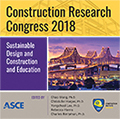Capturing Human Sensation Using Physiological Sensing Devices to Support Human-Centered Indoor Environment Design
Publication: Construction Research Congress 2018
Abstract
The fundamental goal of any building is to deliver value to humans. A well-designed indoor environment could enhance human comfort, health, and productivity, thus delivering high value to the building occupants. However, each occupant is different with different comfort zones or comfort levels. Thus, even the same design could offer different value to different building occupants. Therefore, the value or evaluation of an indoor environmental design should be coupled with a comprehensive understanding of human comfort (i.e., what are the factors that affect the human comfort and how important these factors are). A variety of methods have been developed to solicit information on human comfort. However, existing methods have been criticized of either not accounting for individual human factors (e.g., human sensation, human perception) or lacking real-time responses from the building occupants. Therefore, to address the gap, this paper proposes to use a physiological sensing device to capture human sensation in respond to different indoor environments, thus providing real-time information to support human-centered indoor environment design of the buildings. This paper focuses on using physiological status monitoring (PSM) devices to capture non-intrusive physiological data such as respiration, heart rate and skin temperature, pertaining to the building occupants. Experiments were designed and conducted in different indoor environmental contexts in a classroom of Florida International University. Different combinations of air temperature, relative humidity, air speed, and CO2 levels were designed. A set of building occupants were invited to use the PSM devices to record their sensation data in different environmental settings. The results of the experiments were analyzed and compared against objective physical measurements and traditional subjective measurements. By quantitatively capturing human sensation, which is a vital factor in building design, this research has the potential to provide a better understanding of human building interaction and to facilitate human-centered indoor environment design.
Get full access to this article
View all available purchase options and get full access to this chapter.
Information & Authors
Information
Published In
Copyright
© 2018 American Society of Civil Engineers.
History
Published online: Mar 29, 2018
Authors
Metrics & Citations
Metrics
Citations
Download citation
If you have the appropriate software installed, you can download article citation data to the citation manager of your choice. Simply select your manager software from the list below and click Download.
